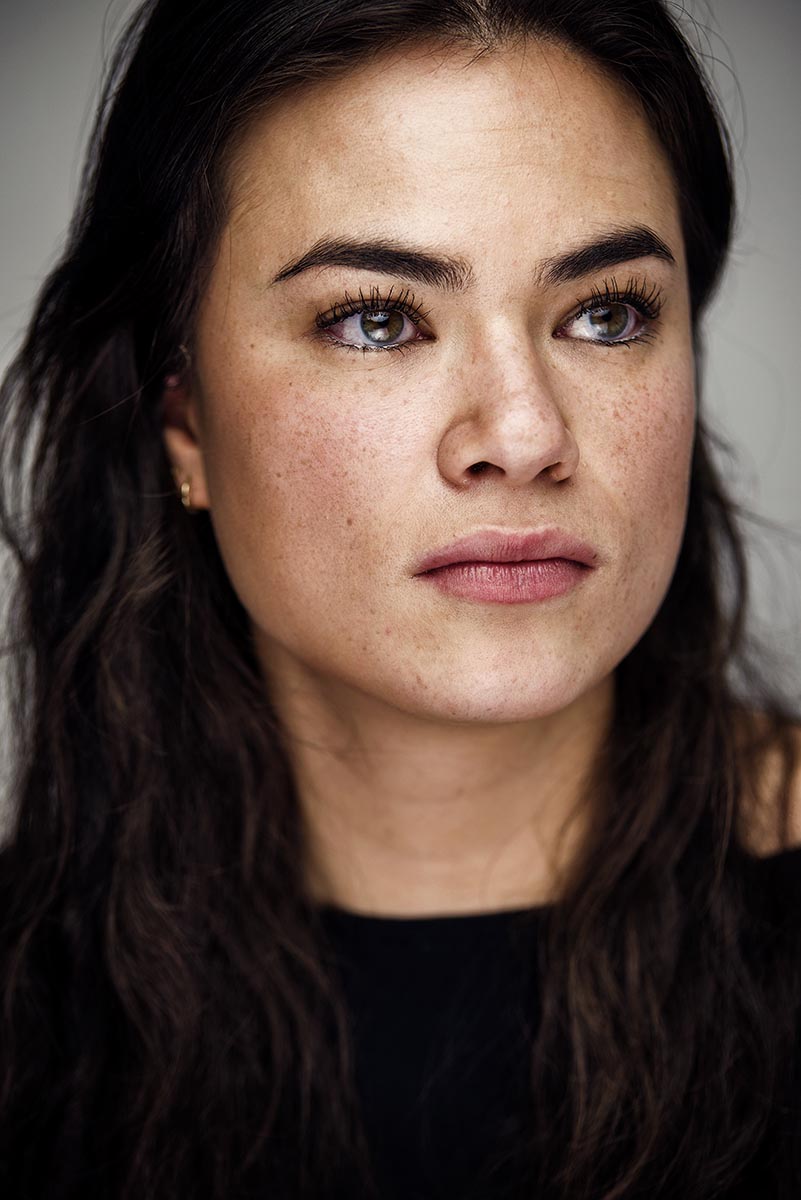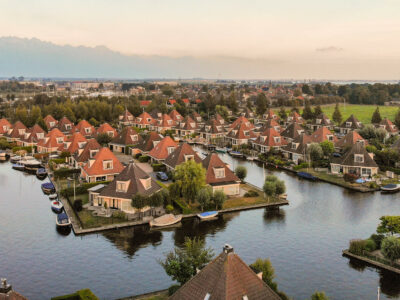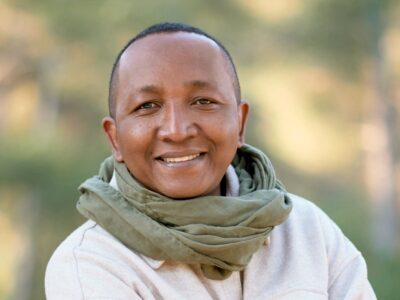
Ny tetikasa Hoezo Indo mitrandraka ny mari-panondroana olona manana lova Indoneziana-Eoropeana mifangaro. Saripikan'i Armando Ello. Nahazoana alalana.
Mpaka sary Armando Ello dia anisan'ireo Indos roa tapitrisa ao Holandy izay nihalehibe tamin'ny fahalalàna kely momba ny maha-indo azy ireo.
Ny Indo dia olona manana fototra Indoneziana sy Eoropeana (indrindra indrindra ny Holandey). Manodidina ny roa tapitrisa ireo Indo monina any Holandy, firenena iray izay nanjanaka an'i Indonezia (fantatra taloha hoe India Holandy Atsinanana) ny taona 1600 hatramin'ny 1945. Misy ihany koa ireo Indo any amin'ny firenena hafa toa an'i Aostralia, Etazonia, ary ny maro hafa.
Indoneziana avy any Kupang, Timoro Andrefana ny renin'i Ello, raha Indo kosa ny rainy. Tamin'ny taona 1970, nifindra tany amin'ny faritra avaratr'i Holandy, toerana nahaterahany sy nahalehibe azy ny ray aman-dreniny.
Nanome aingam-panahy azy mba hitrandraka sy hampiroborobo ny lova Indo sy ny mari-panondroany amin'ny alàlan'ny tetikasa hamoaka boky iray antsoina hoe Twijfelindo (midika hoe “indo feno fisalasalana” amin'ny teny holandey) ny fitiavany tantara sy sary. Nivoaka tamin'ny taona 2016 ary nasongadin'ny National Geographic Netherlands.Ahitana sary sy antsafa niarahana amin'ireo Indos miisa 277 ny ‘Twijfelindo’.
Notarihan'ny fanehoan-kevitra azony momba ity boky ity, nirotsaka tamin'ny tetikasa an-tsary vaovao antsoina hoe Hoezo Indo izy, izay mikendry ny hanasongadinana ireo Indos monina any amin'ny faritra maro manerantany.
Niresadresaka tamin'i Ello tamin'ny alàlan'ny mailaka momba ity tetikasa ity sy ny fikarohana momba ny mari-panondroana maha-indo ny Global Voices.
Global Voices (GV): Inona no dikan'ny hoe Hoezo Indo ary inona no asehon'izany?
Armando Ello (AE): Hoezo Indo project is about exploring further what it means to be Indo. The project name literally means: ‘What do you mean when you say Indo?’ It is the question that young people have regarding their so-called roots. Very often they say they are only partially Indonesian, which is true in a sense, but the word Indo itself signifies descendants of European and indigenous people who live in the Dutch East Indies (how Indonesia was previously known). With this in mind, nobody can claim one part of his mixed heritage but deny the other, because that is not possible. Second of all, Indo is a term that predates Indonesia as a nation; it's the term for the people who were born from European and non-European (indigenous) parents. My project title may sound odd because [it] also serves as a question. Being an Indo is often interpreted as being Indonesian, but this notion is incorrect, at least not for the first generation Indo-Europeans who came to the Netherlands. When we worked on the project's website 10 years ago, we heard a debate about what being Indo is all about. I think people and the younger generations of Indo find it refreshing to question the meaning of Indo as the word was increasingly becoming the status quo.
Armando Ello (AE): Ny tetikasa Hoezo Indo dia fandinihana lalina kokoa mikasika ny dikan'ny hoe Indo. Ny anaran'ny tetikasa dia midika ara-bakiteny hoe: ‘Inona no tianao holazaina rehefa miteny hoe Indo ianao?’ Izany no fanontanian'ny tanora mikasika ilay antsoina hoe ny fototra niavian'izy ireo. Matetika izy ireo no milaza fa indoneziana amin'ny ampahany, izay marina amin'ny heviny iray, fa ny voambolana hoe Indo dia midika hoe taranaky ny Eoropeana sy vahoaka tompotany izay monina any amin'ny India Atsinanana Holandey (nahafantarana an'i Indonezia taloha). Amin'izany, tsy misy olona afaka mitaky ny ampahany amin'ny lova mifangaro ary mandà ny iray hafa, satria tsy azo atao. Faharoa, ny Indo dia voambolana efa nisy talohan'ny nanaovana an'i Indonezia ho firenena; izany no voambolana ho an'ny olona izay teraka avy amin'ny ray aman-dreny Eoropeana sy tsy Eoropeana. Ny lohatenin'ny tetikasako dia mety ho hafahafa satria [sady azo atao ho fanontaniana koa]. Ny maha-Indo dia matetika tondroina ho maha-Indoneziana, saingy tsy marina izany, farafaharatsiny tsy ho an'ny Indo-Eoropeana voalohany tonga tany Holandy. Rehefa niasa tamin'ny tranokalan'ny tetikasa izahay 10 taona lasa izay dia naheno adihevitra momba ny zavatra rehetra hoe inona izany Indo. Heveriko fa ny olona sy ireo taranaka tanora Indo dia mahita fa manavao zavatra indray ny manontany ny dikan'ny Indo satria nanjary zavatra iray tsy niova intsony ny voambolana.

Sary avy amin'i Armando Ello ihany. Nahazoana alalana.Self-portrait by Armando Ello. Used with permission.
GV: Indo, métisy, kréola, sns. Ahoana ny hevitrao momba ireo teny ampiasaina amin'ny fiarahamonina ireo?
Here in the Netherlands, almost everyone has Indo connections, but most people do not know anything about where they come from, including among the Indos themselves.
I have first-hand experiences throughout my whole life. We live in a society that is still centered around colonial perspectives on history: our school curriculum does not elaborate on decolonization and how colonization of Indonesia affected both Indonesia and the Netherlands.
That’s why I see more and more people trying to discover and doing research on this issue nowadays, mostly based on their own family history. The younger generations of Indo are more aware and critical in debates. They're becoming advocates of issues surrounding colonization and decolonization thanks to work of historians, veterans, and others.
Not only that we need to decolonize our education system, but more importantly we need a shift in our own mindset. Because of the growing awareness, we need to change our own mindset.
We can not expect society to know what terms like Indo mean, so we have to explain and educate it ourselves. Here in the Netherlands, we live in society that pivots around European-centric history and school curriculum with a narrow view on colonial history, often to preserve the Dutch reputation. So we discover and research it ourselves through our own family history. Today, we can see the trend of younger generation being critical about decolonization debates and advocate for more awareness within the society in regards of decolonized mindsets and way of life.
Eto Holandy, saika ny tsirairay no manana fifandraisana Indo, saingy ny ankamaroan'ny olona dia tsy mahalala na inona na inona momba ny niavian'izy ireo, anisan'izany ny Indos.
Manana traikefa voalohany nandritra ny fiainako manontolo aho. Miaina ao anatin'ny fiarahamonina iray izay mbola mifototra amin'ny fomba fijerin'ny fanjanahantany eo amin'ny tantara isika: ny fandaharam-pianarana ataontsika dia tsy mamelabelatra momba ny fialàna amin'ny fanjanahantany sy ny fiantraikan'ny fanjanahana an'i Indonezia teo amin'i Indonezia sy Holandy.
Izany no mahatonga ahy mahita olona miha-maro hatrany miezaka mamantatra sy manao fikarohana momba ity lohahevitra ity amin'izao fotoana izao, indrindra fa mifototra amin'ny tantaram-pianakaviany manokana. Ny taranaka tanora Indo no mahafantatra kokoa sy manakiana ny adihevitra. Lasa mpisolovava momba ny olana manodidina ny fanjanahan-tany sy ny fanafahana ny zanatany izy ireo noho ny asan'ireo mpahay tantara, menavazana sy ny hafa.
Tsy vitan'ny hoe mila manala ny rafitra fanabeazana voazanaka isika, fa ny tena zava-dehibe dia mila fiovana eo amin'ny fomba fisainantsika isika. Noho ny fahatsapana tsy mitsaha-mitombo, dia mila manova ny fomba fisainantsika manokana isika.
Tsy azontsika antenaina hahafantatra ny dikan'ny teny hoe Indo ny fiarahamonina, ka tsy maintsy manazava sy mampianatra izany isika manokana. Eto Holandy, miaina anaty fiarahamonina izay mamakivaky tantara sy fandaharam-pianarana Eoropeana miaraka amin'ny fomba fijery tery momba ny tantaran'ny fanjanahantany isika, matetika mba hitazomana ny lazan'ny Holandey. Noho izany dia mahita sy mikaroka manokana amin'ny amin'ny alalan'ny tantaram-pianakaviantsika manokana isika. Ankehitriny, azontsika jerena ny firoborobon'ny taranaka tanora izay manakiana ny adihevitra momba ny fanafahana ny zanatany ary manohana ny fanentanana bebe kokoa ao anatin'ny fiaraha-monina mikasika ny fomba fisainana sy fomba fiainana tsy zanantany .
GV: Momba ny inona ny tetikasanao manaraka (bokintsary tsy misy anarana)?
AE: My next project is about spreading the idea of being of individuals of mixed blood who live in different countries and societies. Share the stories about where you come from, so people learn to better understand. That is why I’m now photographing Indo-European people all over the world that share the same history.
AE: Ny tetikasako manaraka dia ny fampielezana ny hevitra hoe ny maha-olona ny rà mifangaro izay miaina any amin'ny firenena sy ny fiarahamonina samihafa. Zarao ireo tantara momba ny toerana misy anao, mba hahalalan'ny olona izany. Izany no mahatonga ahy izao haka sary ny olona Indo-Eoropa manerana izao tontolo izao izay manana tantara mitovy.
GV: Lazao anay ny fanantenanao sy ny andrandrainao amin'ny tetikasanao ho avy.
AE: I hope that this project will raise awareness about our roots. Someone once told me that roots of humanity are like the roots of a tree — without them, the tree will fall. Yes, we should focus on building our future, but we cannot ignore the past. Our present and future are built upon our past. We should let others see who we are and that we have interesting histories to share. I’m taking this project to the next level by photographing and interviewing various Indos that live all over the world. I have started a crowdfunding campaign this December that runs until the end of the year. At the moment, we've raised more than 3,400 Euros out of the 10,000 Euros expected. This will fund my upcoming book and photography trips to meet the individuals who will be featured in the book.
The project will feature portraits accompanied by short stories. Other than that, I'm planning a traveling photo exposition and made a documentary that centers around this upcoming project. I really hope to find more Indo-Europeans, preferably in countries where I least expect it.
AE: Manantena aho fa ity tetikasa ity dia hanentana momba ny fiaviantsika. Nisy olona iray nilaza tamiko fa ny fototry ny olombelona dia tahaka ny fakan'ny hazo – raha tsy misy azy dia hianjera ilay hazo. Eny, tokony hifantoka amin'ny fanorenana ny hoavintsika isika, saingy tsy afaka ny tsy hiraharaha ny lasa. Ny ankehitriny sy ny hoavintsika dia natsangana tamin'ny lasa. Tokony hamela ny hafa hahita isika hoe iza isika ary manana tantara mahaliana zaraina isika. Mandray ity tetikasa ity mankany amin'ny ambaratonga manaraka aho amin'ny fakana sary sy fanadihadiana Indos isan-karazany manerana izao tontolo izao. Nanomboka fanentanana fanangonam-bola aho tamin'ity Desambra ity ary hifarana hatramin'ny faran'ny taona. Amin'izao fotoana izao, dia efa nahangona 3 400 Euros mahery tamin'ny 10.000 Euros nandrasana izahay. Hamatsy ny boky sy ny fitsangatsanganana an-tsariko mba hihaonana amin'ireo olona izay ho aseho amin'ny boky izany.
Ny tetikasa dia ahitana sary miaraka amin'ny tantara fohy. Ankoatra izay, mikasa hanao fampiratiana sary mitety tany aho ary nanao lahatsary fanadihadiana mifantoka amin'ity tetikasa ho avy ity. Tena manantena aho fa hahita Indo-Eoropeanina bebe kokoa, indrindra any amin'ireo firenena izay tsy noheveriko loatra.
Ireto misy sasantsasany avy amin'ny tetikasan-tsarin'i Ello tamin'ny taona 2016:

Tetikasa Hoezo Indo mijery ny maha-izy ny olona miaraka amin'ny lova Indoneziana-Eoropeana mifangaro. Saripikan'i Armando Ello, nahazoana alalana

Tetikasa Hoezo Indo mijery ny maha-izy ny olona manana lova Indoneziana-Eoropeana mifangaro. Sary avy amin'i Armando Ello, nahazoana alalana.

Bokin-tsary Twijfelindo navoaka tamin'ny taona 2016. Sary avy amin'i Armando Ello, nahazoana alalana.






